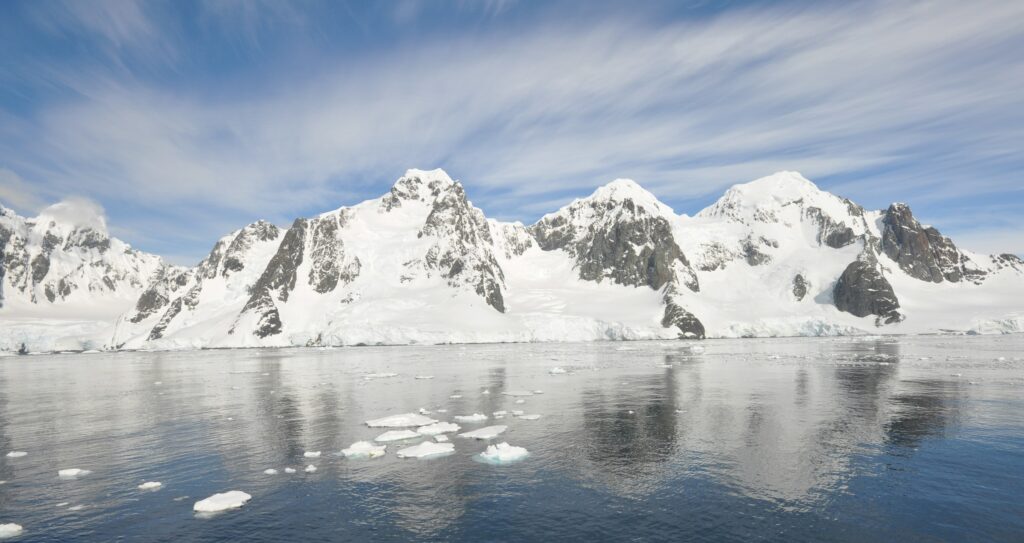Articles

D Dhanuraj of CPPR comments in TNIE on Seaport-Airport Road Extension
September 30, 2025
EP 65 | Public Choice Theory – An Introduction | Policy Beyond Politics
October 1, 2025Military and Mining Ambitions of Russia and China Threaten the Antarctica Treaty

While there are positive global trends towards the use of renewable energy, the hydrocarbon exploration on land and at sea continues unabated.
Oil Find in Antarctica and the Antarctic Treaty
The most recent announcement is by Russia that there are untapped hydrocarbon basins in the Weddell Sea in Antarctica. Based on its seismic surveys, Russia’s state geological exploration company has claimed that there are oil and natural gas deposits equivalent to 511 billion barrels of oil equivalent in the depths of Antarctica.
The assessment of the reserves beneath Antartica is reported to be nearly double that of Saudi Arabia’s proven reserves, and more than tenfold of the total output in the North Sea over the last 50 years. While this data has the potential to result in excitement among offshore energy companies expecting lucrative ventures, it is to be noted that the 1959 Antarctic Treaty prohibits mineral exploration and drilling in the southern polar region. Besides, the above data relating to the energy reserves is rather speculative.
Russia’s Hydrocarbon and Mining Ambitions in Antarctica
Russia has publicly professed that its engagements in Antarctica are purely for scientific purposes, but has also made note of the strategic importance of Antarctica. It has set up 11 sites (five permanent, five seasonal, and one closed) for scientific research. Furthermore, at least four official documents, i.e., the 2021 Russian National Security Strategy, the Antarctic Action Plan for 2030 (2021), the Maritime Doctrine (2022), and the Concept of the Foreign Policy of the Russian Federation (2023), highlight the importance of Antarctica to Russia in its security and foreign policy calculus.
In this context, in 2024, President Vladimir Putin announced that large financial investments had been set aside for undertaking exploration in the Antarctic in the next two years. Later that year, Russian Defence Minister Andrey Belousov alluded to Russia’s scientific, economic, and geopolitical interests. This caused concern in the international community about Russia’s commitment to the Antarctic Treaty, which prohibits commercial or military activity in the area.
It is alleged that Russia conducts dual-purpose activities in the Antarctic, which could support its military ambitions. For instance, hydrographic surveys in waters around Antarctica-Southern Ocean support naval surveillance and intelligence collection, particularly by submarines, which generally operate outside the perimeter around the Antarctic Treaty System (ATS) governing Antarctica. In 2018, Russia refused inspection of the Novo and Perseus runways at the Novolazarevskaya air base over the nature of Russian activities at the base, raising concerns regarding military and intelligence activities. Russia is also suspected of investing in technologies that are to be used by the armed forces in extreme weather conditions. Meanwhile, Russian defence companies have undertaken aerial drone tests in Antarctica.
China’s Expanding Strategic Presence in Antarctica
China, too, is actively engaged in Antarctica and has established three permanent and three seasonal sites for scientific study. It claims to have no geopolitical motive and that there should be no overreading, misreading, or overreaction. The Chinese Ambassador to Australia, Xiao Qian, observed that his country was ready to cooperate with the other members of the Antarctic Treaty, thereby adding transparency to Chinese scientific activities on the continent. He even offered to open Chinese facilities for inspection, to share technology and information, and to engage in collaborations.
However, it has been assessed that China’s interests in the Antarctic go beyond scientific research. It wants to exploit the krill fishery (for food and feedstock) in the Southern Ocean and explore energy and mineral resources. China is also building capabilities to exert sea control in the Southern Ocean by deploying icebreakers, obtaining maritime domain awareness, and setting up communications. It can even replicate its strategy for militarization in the South China Sea and initiate illegal, unreported and unregulated (IUU) fishing in and around Antarctica.
Risks of Militarization and Geopolitical Tensions
The Russian and Chinese assurances that their activities in the Antarctic are in line with the 1959 Antarctic Treaty have not cut ice, and there are sufficient reasons to believe that geopolitical, geostrategic, and geoeconomic ambitions will drive their agenda, as seen in the Arctic. This may preclude Antarctica from remaining a zone of peace, scientific exploration, and free of military activities as envisaged under the 1959 Antarctic Treaty (1959) and the 1998 Madrid Protocol.
Also of interest would be the Russian and Chinese future national positions on the various provisions of the Antarctic Treaty—they may seek modifications to enable exploitation activities as and when these become economically viable. They may even justify and engage in dual (civil and military) activities, such as underwater surveillance by positioning sensors and devices. This can potentially result in politico-strategic maneuvering and competition in the Antarctic with possible implications for the Antarctic Treaty System.
The article was originally published by the Center of Excellence for Geopolitics and International Studies (CEGIS), REVA University, Bengaluru.
Dr Vijay Sakhuja is Professor and Head, Center of Excellence for Geopolitics and International Studies (CEGIS), REVA University, Bengaluru, and Hon. Distinguished Fellow, Centre for Public Policy Research (CPPR), Kochi.
Views expressed by the authors are personal and need not reflect or represent the views of the Centre for Public Policy Research (CPPR).
Dr Vijay Sakhuja is Honorary Distinguished Fellow with CPPR and associated with our Centre for Strategic Studies. Dr. Sakhuja, a former Indian Navy officer, is also former Director, National Maritime Foundation, New Delhi. He earned his MPhil and PhD from the Jawaharlal Nehru University, New Delhi. He specializes in issues of national security and public policy, particularly in the context of ocean affairs, geopolitics, Climate Change, Arctic, Blue Economy and 4th Industrial Revolution Technologies.

